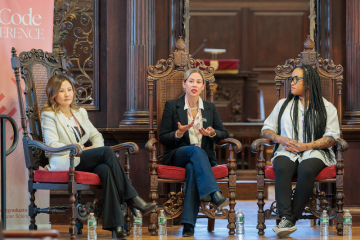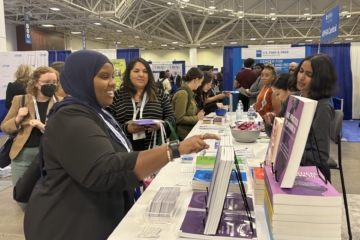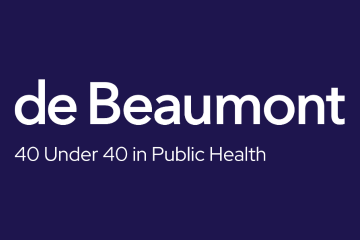Read Jeffrey’s bio. See all 40 Under 40 honorees.
Five Questions for Jeffrey

Jeffrey Hom presenting at TEDxUSciences in September 2019 on the topic of harm reduction and health.
1. Who or what inspired you to enter the field of public health?
While many people nurtured my interest, it was Dr. Mitch Katz who inspired me to pursue public service and a career in public health. When I met Dr. Katz, he was director of the Department of Public Health in San Francisco, my hometown, where he had achieved major public health victories, championed creative and progressive health initiatives, and made such an impact. Seeing the department’s work and his leadership opened my eyes to the possibilities of improving health through the work of a municipal public health department.
2. What is one of the most interesting projects you’ve worked on?
In my current role, I’ve been fortunate to work on a number of interesting projects, including co-chairing the Prevention and Public Education Subcommittee of Mayor Kenney’s opioid task force. What made it so meaningful was the breadth and depth of those on the subcommittee. Representing many points of view – including parents, physicians, educators, people with lived experience, and social workers – our committee members were, and continue to be, among the most engaged, thoughtful, and inspiring people I’ve had the privilege of learning from. It was rewarding to work with this group to address an issue that affects us all.
3. What are the greatest challenges you face in your work?
Stigma is such a challenge in addressing substance use, both at the individual and population health levels. In public health, this stigma manifests itself in policies that jeopardize the health of people who use drugs. For example, fear of and stigma toward those who use drugs leads to policies that prohibit syringe exchange programs. These programs are proven public health interventions that reduce the spread of infectious diseases, connect people to treatment, and provide other important social services for a marginalized population.
4. What would success in public health look like to you?
To me, success in public health will be when all people have both the opportunities and the conditions to lead healthy and productive lives, and when their physical environment and social circumstances are no longer predictive of their standing or life expectancy. Achieving this will require more widespread adoption of public health policies and a greater alignment between funding/resources and successful public health programs.
5. As a kid, what did you want to be when you grew up?
After I outgrew the idea of being a unicycling and juggling circus performer, I wanted to first be a teacher and then a doctor. Not a day goes by that I’m not grateful to be able to do what I wanted to do.




